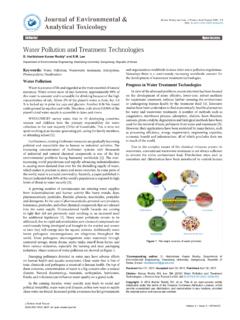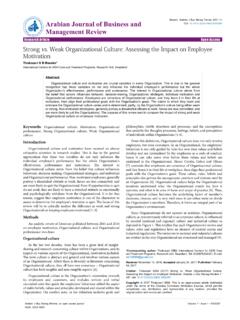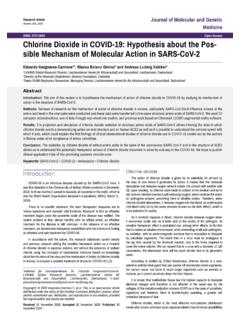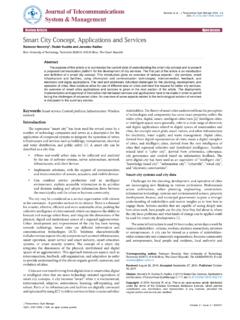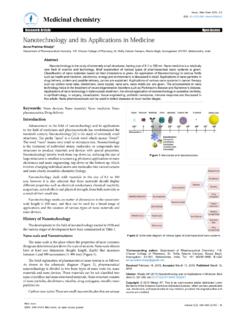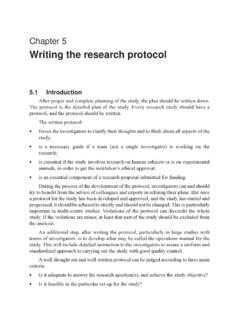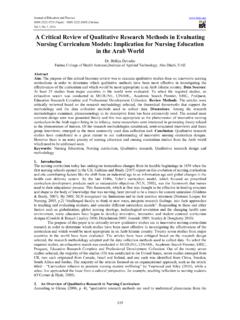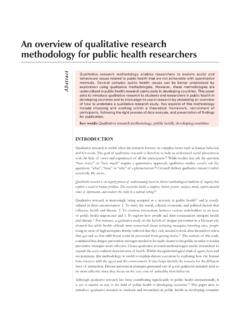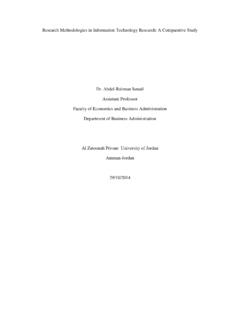Transcription of Research Design and Methods: A Systematic Review of ...
1 Onomics &. Ec Rahi, Int J Econ Manag Sci 2017, 6:2. International Journal of Economics &. of M. DOI: l nal Journa an agement Sc Management Sciences tio ISSN: 2162-6359. na r en i Research Article Open Access ces Inte Research Article Open Access Research Design and Methods: A Systematic Review of Research Paradigms, Sampling Issues and Instruments Development Samar Rahi*. Universiti Sultan Zainal Abidin, Terengganu, Malaysia Abstract This study is aimed at to contribute a detailed Systematic Review on Research paradigms, sampling and instrument development issues in the field of business Research . This study has reconnoitered the levels of theory and their implications in academic literature. With accession to this the methods of quantitative and qualitative Research have been discussed. The main contribution of this study was to explore the sampling size issues. A meticulous Review has bared the exact sample size that is supported by different researchers.
2 In line with measurement scale has also been discussed based on previous literature support. Finally, the problems faced during scale development and items generation are discussed in detail. Keywords: Research methods; Sampling issue; Research paradigms; felt that positivist paradigm does not adequately address on social Scale development process and political issues. In views of this, authors like Fay [7], Kemmis and Wilkinson [8] have arose the importance of advocacy paradigm in their Introduction studies. These researchers believe that inquiry needs to be entangled The term paradigm' described as essential collection of beliefs with political and social issues. In accession of this Research should shared by scientists, a set of agreements about how problems are to contain the agenda of reform that ultimately address the issues of be understood, how we view the world and thus go about conducting empowerment, inequality, oppression, domination, suppression, and Research [1].
3 Thus, these paradigms contain a basic set of beliefs or alienation. assumptions that guide our inquiries for a particular Research [2]. In The pragmatism paradigm views of this, author like Myers and Avison [3] have stated that for defining a valid Research the most recommended method is to follow The aim of this paradigm is to find the weaknesses in the study and the Research paradigm. This is essential because by selecting a specific to strengthen it by using mix method approach [9]. The supporter of this paradigm researcher does not dwell in his own philosophical know- paradigm believes that true knowledge can be obtained by mix method how and get a better stance chosen in relation to other alternatives. approach. Instead of method being important, the problem is most There are mainly four paradigms that have been widely used in important and researchers should use all approaches to understand information system Research include Positivism, Interpretive, Advocacy the problem statement [10].
4 Pragmatism is not affiliated to any system and Pragmatism [4]. Positivist, Interpretive and Advocacy paradigm or philosophy. The researchers are free to use both quantitative and are discussed below in Table 1, as Pragmatism is the combination of qualitative approaches; the essential is to find the best techniques and Interpretive and Positivism. procedure of Research that solve problem statement. The positivist paradigm Philosophical assumptions The supporters of this paradigm believe that true knowledge can be There are seven different philosophical assumptions comprise obtained through observation and experiment. So Positivists normally Ontology, Epistemology, Axiology, Rhetoric, Methodology, Strategies select scientific method to produce knowledge. Positivism is also called of Inquiry and Methods that follows all four paradigms. Ontology deals Scientific Method, Empirical Science, Post Positivism and Quantitative with the nature of reality about the concept of knowledge whereas Research .
5 Levine et al. [5], discussed that in positivism reality remains Epistemology deals with the connection between the researcher and stable and can be observed or described through an objective. A strong that being researched [11]. debate is available on the issue of using positivist paradigm that whether it is appropriate for social sciences or not [6]. Levels of Theory Theory is a standardized principle on which basis we can explain The interpretive paradigm the relationship between two or more concepts and variables. There The supporter of interpretive paradigm believes on the deep understanding of a concept and explores the understanding of the world in which they live. They develop subjective meanings of their *Corresponding author: Samar Rahi, Universiti Sultan Zainal Abidin, Terengganu, Malaysia, Tel: 601114314906; E-mail: experiences or towards certain objects or things. This paradigm is also called Constructivism, Social Constructivism or Qualitative Research Received December 29, 2016; Accepted January 23, 2017; Published January paradigm.
6 Interpretive believe that true knowledge can only be 25, 2017. obtained by deep interpretation of subject. Citation: Rahi S (2017) Research Design and Methods: A Systematic Review of Research Paradigms, Sampling Issues and Instruments Development. Int J Econ The advocacy/participatory paradigm Manag Sci 6: 403. doi: The supporters of advocacy paradigm claim knowledge through an Copyright: 2017 Rahi S. This is an open-access article distributed under the terms of the Creative Commons Attribution License, which permits unrestricted advocacy paradigm. This paradigm is also known as critical paradigm. use, distribution, and reproduction in any medium, provided the original author and A debate started during the 1980s and 1990s from individuals who source are credited. Int J Econ Manag Sci, an open access journal Volume 6 Issue 2 1000403. ISSN: 2162-6359. Citation: Rahi S (2017) Research Design and Methods: A Systematic Review of Research Paradigms, Sampling Issues and Instruments Development.
7 Int J Econ Manag Sci 6: 403. doi: Page 2 of 5. Research Paradigm/Knowledge Claim Positions Positivist Constructivism Determination Understanding Reductionism Multiple participant meanings Empirical observation and measurement Social and historical construction Theory verification Theory generation Advocacy/Participatory Pragmatism Political Consequences of actions Empowerment issue-oriented Problem-centered Collaborative Pluralistic Change-oriented Real-world practice oriented Table 1: Depicts key functionalities of all paradigms posited by Creswell [1]. are two levels of theory first abstract level that follows inductive theory Research objectives and classification approach and second is empirical level that follows deductive theory approach. There are three basic forms of Research objectives that include exploratory Research , descriptive Research , and explanatory Research . Inductive level The purpose of exploratory Research is to seek new insights and find out what is happening.
8 There is an attempt to ask questions and asses Collis and Hussey [12] defined inductive approach this approach phenomena in a new light. This type of Research is usually adopted in elaborate a process where theory is developed by observation that what early stages of Research where the concepts are not clear enough to researcher has observed during his Research more over it may called a develop an operational definition. A more qualitative approach often process where you induce or inferences your thought about a specific underpins this sort of inquiry and the focus is on obtaining new insights object or variable. In accession to this Collis and Hussey have explained into current situations and issues. Descriptive method of Research refers the induction process in which a relationship between meanings and to the type of Research that aimed at obtaining information on current actions of human subjects are used to be observed and investigated.
9 State of phenomena. This type of Research sets out to provide an accurate Deductive level profile of situations, people or events. Similar to this accession author like Polit et al. [14] have stated that descriptive Research seeks to observe According to Collis et al. deductive approach where you don't and document an occurring phenomenon which cannot be ascribed an get theory from observation theory already existed and proved by objective value. Cohen et al. [15] have posited that explanatory Research researchers moreover you can explain a Research that based on empirical helps this type of study for instance explanatory Research helps to find observation and theory generated on conceptual and theoretical out the reasons behind the occurrence of a particular phenomenon. structure. Generally researcher intends to test a theory by collecting Explanatory Research explains a situation or problem usually in the the fresh data from respondents and observe the findings by applying form of casual relationships.
10 This type of Research helps one to get fresh various statistical tests. This method is generally recommended for insight into a situation in order to build, elaborate, extend or test a specific studies in which researcher work on particular concept by theory. The prime objective of explanatory Research is to identify issues creating assumptions and then verifying those assumptions. and key variable in a given Research problem. This approach is much relevant to quantitative. Research Methods Despite the existence of much Research method classification Research strategy quantitative and qualitative methods are the most dominating methods. Research Strategy defines it is a process of collecting and Detailed descriptions of these two methods are stated below. interpreting of data with a clear objectives. Easterby-Smith et al. [16]. have stated that, Research strategy is a general plan like how to answer Qualitative method the Research question that has been set by researcher.


